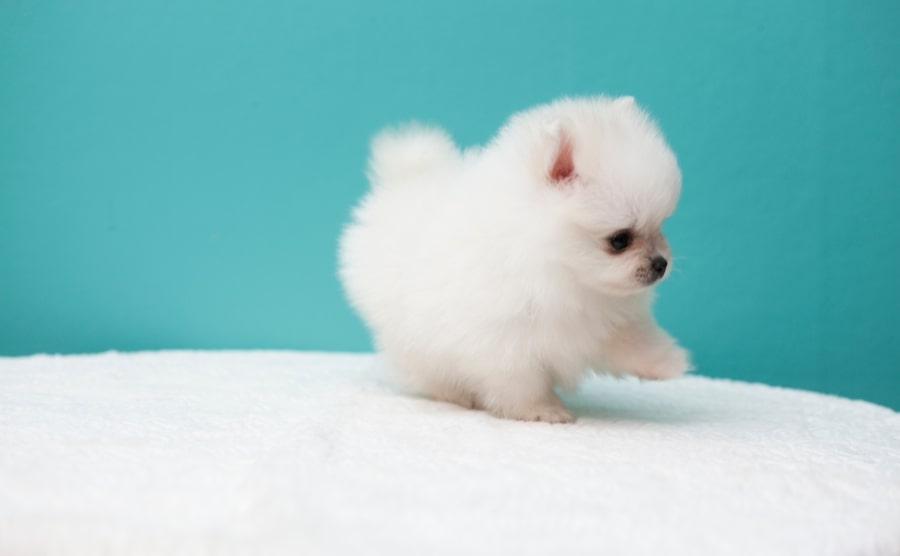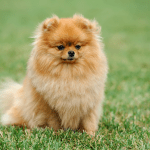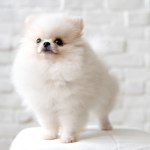Congratulations! You finally have little furry Poms to take care of. There is nothing cuter than a baby Pomeranian; I can assure you that. I remember when my Pomeranian gave birth to her first litter, it was like a dream come true. And I quickly learned how to take good care of them.
So, how to take care of newborn Pomeranian puppies? Keep Pomeranian puppies in a warm room at 70 to 90°F for the first 20 days after birth. Once they start eating solid foods, feed them meals that contain a minimum of 8% fat and 22% protein, and monitor their health to notice any changes in their blood sugar levels.
Here, I will show you how to keep the puppies warm, when to take them to the vet, how to pay attention to their diet, measure them, and more. I’ve been through all of that a million times before, which is why I will show you how to do it and why it matters.
7 Important Tips on How to Take Care of Newborn Pomeranian Puppies
The most exciting time is the moment your momma pom gives birth to lovely Pomeranian puppies. But, the moment you see those tiny furballs, you immediately start doubting your capabilities to care for them properly.
Don’t worry; this can happen to anyone. After all, they do look very tiny and vulnerable. You have no idea if they are healthy or not, whether they need a vet or what you should do to keep them safe. Here are a couple of things I think will help you solve this problem.
1. Paying Attention to the Room Temperature Ensures a Healthy Puppy
When a Pom puppy is born, their muscles aren’t fully developed yet, so it can’t move properly or control their bladder or bowels. It can’t crawl to a warmer area, which is why it can be exposed to the cold.
If you don’t have a momma Pomeranian to take care of her babies, you need to make sure they stay warm. An adequate temperature in your house is crucial if you want the puppies to stay healthy and develop properly.
The temperatures you should pay attention to depends on how old the baby is. In this table, I can show you how a generally ideal room temperature looks like for a baby Pomeranian.
| Days after birth | Temperatures in Celsius (°C) | Temperatures in Fahrenheit (°F) |
| Day 1 to 7 | 29-32 | 85-90 |
| Day 8 to 14 | 26-29 | 80-85 |
| Day 15 to 21 | 23-26 | 75-80 |
| Day 22 to 28 | 21-23 | 70-75 |
As you can see, in general, puppies do well when it’s warm, but not too hot. To keep the temperature at a healthy level, you can raise your heating system or use a heating pad under its blanket to keep it warm. But, make sure to check it often and keep the pad on low.
2. Measure Your Puppies For the First Couple of Weeks
During the first couple of weeks, you will consistently notice changes. This is normal since it is the time of growth. Your little puppies will constantly be gaining weight and forming. This is normal, but if you want to make sure your puppies are healthy, it’s best to weigh them every day on a kitchen scale.
If you don’t notice any progress in their weight gain, contact your vet. By the third week, your puppies will be able to hear and explore the world. Even though they’re still unsteady and can’t run or jump properly, they will do their best to wobble around.
3. A Puppy Can Start Eating Solid Food at 4 to 5 Weeks
When your puppy is ready to change from nursing to eating solid foods, you need to take the first step and introduce your dog to these foods. When it’s 4 to 5 weeks old, you can slowly make this change and make a mixture of milk and soft foods.
Any food that is mushy is a great start. As your puppy gets accustomed to chewing, you can slowly reduce the amount of liquid you use until your puppy finally chews solid food. However, if you make rapid changes and give your puppy food it’s not used to, it can cause intestinal duress and stomach pain.
4. A Puppy Pomeranian Diet Has to Have Proper Nutrition
Baby Pomeranians need plenty of calories and proteins to develop. These nutrients are the best source of fuel for these Poms. When your dog is ready to start eating solid foods, you should focus on providing them a minimum of 8% fat and 22% protein in meals.
You can also increase the amount of fat from around 15% to 20%, but if you do that, you will have to add more protein too. Dog food for small-breed puppies are an excellent source of protein.
5. Be Careful When Picking Up A Baby Pomeranian
Baby Pomeranians have fragile and very tiny bones. You can easily hurt them if you aren’t careful. If you want to pick them up, do it with care. Use both of your hands instead of one and gently place the puppy on your chest. Let your arms carefully and comfortably rest on their bodies and secure them in place. This way, you won’t crush the puppy, and it will sleep in your arms.
6. Maintain Healthy Blood Sugar Levels to Avoid Hypoglycemia
Young puppies, especially Pomeranian puppies, are vulnerable to low blood sugar levels. Your Pomeranian is no exception. No matter how healthy they look, you still need to be certain that their blood sugar levels are stable.
It’s common for puppies this little to experience a sudden drop and get hypoglycemia. If your dog has been exposed to stress or hasn’t been eating well, take it to the vet, this could be a sign of decreased blood sugar levels.
This problem can be treated at home, as well. I use a little bit of honey and rub it on my puppy’s gums. The honey provides healthy sugars and it gets absorbed into the bloodstream pretty quickly. If you want to use something else, you can always consult with your vet.
If the blood sugar levels still drop after home treatment, and your dog is weak, sleepy, dizzy, or can’t balance properly, it means it’s facing a much more serious condition. Your dog will need professional help. In such cases, the vet will take blood tests or an IV to check your puppy.
7. A Baby Pomeranian Should Get Vaccinated at 6 Weeks Old
Your furry pom needs to receive timely de-worming and vaccinations when it’s 6 weeks old. It’ll keep receiving these vaccines until it’s 16 weeks old. These vaccines prevent hepatitis, parvovirus, and distemper.
Your vet will also vaccinate your puppy against rabies. This type of care is crucial since it boosts their immune system and protects them against diseases and infections.
Quick Summary
Taking care of newborn Pomeranian puppies isn’t easy. You’ll have to pay attention to the food they eat, the nutrition they get, vaccines, and more. But, most importantly, you have to monitor their health as they grow.
Pomeranians are a much weaker breed than most other dogs. So, you have to be prepared to take on a huge responsibility now that you’ve welcomed new puppies in your home. If they are healthy, they will bring all the love and happiness they can offer.





